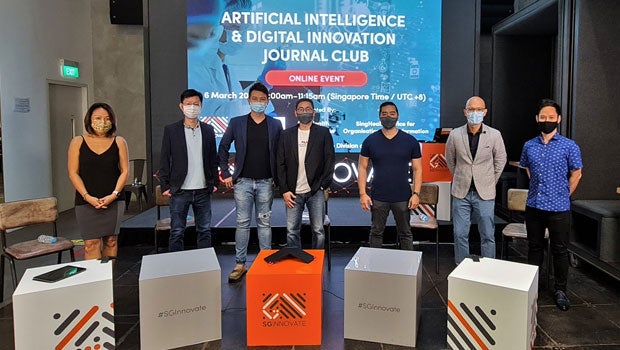
Advancements in Artificial Intelligence (AI) coupled with the democratisation of data can pave the way to a new level of personalised healthcare, patient self-care. Greater innovation and partnerships are needed to make this a reality.
Imagine waking up ill, but instead of having to brave the queue at the clinic, you simply click on an app in your smart phone. Within seconds, your condition is diagnosed and medicine is on the way.
With the latest advances in machine learning, this level of patient self-care is closer than we might think.
“Hopefully one day as AI progresses, everything will be democratised and repackaged into your mobile phone, so you can literally self-care,” said Benedict Tan, Group Chief Digital Strategy Officer at SingHealth. Speaking at a webinar “Artificial Intelligence and Digital Innovation Journal Club”, Mr Tan described his vision of a future where Artificial Intelligence (AI) supports not just personalised medicine, but also patient self-care.
The webinar was organised by SGInnovate, in collaboration with SingHealth Duke-NUS Academic Medical Centre, SingHealth AI Programme, SingHealth Division of Digital Strategy and SingHealth Office for Organisational Transformation on 6 March 2021, where Mr Tan shared his thoughts on the potential of AI, as well as the hurdles to overcome in the future.
Get updates on Tomorrow's Medicine in your mailbox! Click here to subscribe.
The pressure is on to get “smart” and stay safe
Mr Tan noted that as diseases become more complex and demands on the healthcare sector rise, AI has already begun to fill the gap.
Use of AI to cut time for diagnosis and treatment abound across the world, and Singapore is no exception. At the Singapore National Eye Centre (SNEC), an AI technology is reducing the time taken to analyse the results of an eye scan for signs of diabetes from an hour to just three minutes. Singapore Eye Lesion Analyser Plus (SELENA+) is a deep learning system jointly developed by a research team from SNEC, Singapore Eye Research Institute (SERI) and the National University of Singapore's School of Computing.
Yet we are still only scratching the surface. “To increase productivity and continue to maintain healthcare standards, we will have to deploy more and more AI,” Mr Tan said.
He has observed that locally, interest in using AI is high, and more tech companies are coming together with businesses to ask SingHealth for support in providing the data, resources and facilities to get the technology validated.
However, he is quick to add that there are still hurdles to cross, namely in ensuring the technology is safe for use. As AI solutions developed in a different cultural context may not be relevant in Asia, there are challenges in both collecting and confirming the integrity and the accuracy of the data.
“I think that’s the ultimate challenge that we have,” he said, adding that there is no silver bullet: as with all technology. “We need to test, test, and test.”
Teamwork to make the AI dream work
During the panel discussion, Professor Dean Ho, Director, N.1 & WisDM, NUS, also noted that challenges can arise in the implementation of new technology.
“There needs to be a collaborative way of designing studies to truly determine if that technology is effective. The technology alone can be amazing, but is it making your life easier? Is it resulting in better outcomes for patients?” he asked.
To find out, Prof Ho advocated for partnerships between professionals from medicine, engineering, biomedical sciences and even logistics, to name a few.
The proximity of professionals from these different sectors in one location give Singapore unique advantage in this area. “ We have to leverage what's unique and amazing about this ecosystem, and compare that with addressing the unmet needs,” he said.
Echoing these thoughts, Mr Tan reiterated the need for more partnerships in the healthcare sector, whether through collaborations with organisations like SGInnovate to share knowledge in the area, or by working with institutes of higher learning to develop an AI talent pipeline.
“I hope that the SingHealth AI Health Programme will be the start to getting more and more people to gather at the same spot, and see how we can work collaboratively to the same goal.” he said.
It is with this that the country will move closer to the era of self-managed care. “And that to me will be the utopia of medicine,” Mr Tan concluded.
Get updates on Tomorrow's Medicine in your mailbox! Click here to subscribe.













 Get it on Google Play
Get it on Google Play